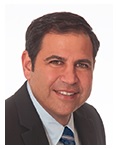 |
| Alexion CEO David Hallal |
Alexion jumped into the M&A game today, striking a deal to acquire the rare-disease biotech Synageva for $8.4 billion in cash and stock in a deal that gives shareholders a big premium and the industry another example of the fast-rising valuations in the biotech world.
Alexion ($ALXN) is paying $115 per share in cash and 0.6581 of a share of its stock for each share of Lexington, MA-based Synageva ($GEVA)--roughly $230 a share total. On Tuesday, Synageva's stock closed at $95.87, giving it a market cap of $3.5 billion. The buyout gives shareholders a remarkable 135% one-day premium.
Much of Synageva's value revolves around its late-stage drug Kanuma (sebelipase alfa), which is designed to treat lethal cases of early onset lysosomal acid lipase deficiency, an inherited disease that often kills infants in a matter of months. The FDA provided its breakthrough therapy designation for the drug back in 2013, not long after the program started. The FDA accepted Synageva's marketing application for the therapy in February, setting a deadline for its decision on September 8. Given its BTD status, though, an approval could come earlier, leaving Alexion looking at a near-term launch of a new drug.
Synageva's rare-disease focus will fit neatly into Alexion's own strategy. Alexion scored a major success with the approval of Soliris, the most expensive treatment on the planet. Sold for more than $500,000 a year to treat the blood disorder paroxysmal nocturnal hemoglobinuria, an expanding market around the world has spurred fast revenue growth at Alexion, leaving it well positioned to swoop in on a therapy like Kanuma.
Once the deal is complete, Alexion plans to get to work cutting costs as it integrates Synageva into the company. Annual cost "synergies" are expected to hit $150 million in 2017, which will likely lead to layoffs. Analysts will also start wondering if Alexion management has great expectations regarding its ability to boost the price on Kanuma. Nomura equity analyst Ian Somayia recently cited the drug as a "potential blockbuster," while Alexion's $8.4 billion buyout for the company indicates that they're aiming at an ambitious drug price that may drive up those forecasts.
"Strategically, we get the rationale for the deal and we think that it makes sense given Alexion's global commercial infrastructure and focus on ultra-orphan diseases," Barclay's wrote this morning. "In our view, Kanuma could be a $1-1.5B peak (worldwide) sales opportunity and SBC-103 for MPS3B is in phase 1/2 development. That said, the price looks rich, considering that it may take 2-3 years for Kanuma sales to be meaningful, which is about the time that Alexion expects the deal to be accretive (2018)."
Deals like this have been steadily driving up the value of biotech assets over the past two years. With the public markets embracing biotech more companies can afford to be choosy over its deals, leaving buyers bidding higher and higher numbers to complete a buyout or licensing pact. Just two months ago AbbVie ($ABBV) agreed to a jaw-dropping $21 billion buyout of Pharmacyclics after engaging in an intense bidding war with at least two other Big Pharmas at the table. That deal also largely revolved around the value of a single drug: Imbruvica.
These big figures are helping drive up biotech shares at a time when analysts are engaged in an ongoing debate over whether the fast rise of biotech represents a bubble or a durable bull market that better represents the true value of new drugs in the pipeline.
"Synageva is an ideal strategic and operational fit for Alexion that aligns with what we know well and do well--providing life-transforming therapies to an increasing number of patients with devastating and rare diseases," said David Hallal, the CEO of Alexion. "With strong ongoing Soliris growth in PNH and aHUS worldwide, and the anticipated 2015 global launches of Strensiq and Kanuma, we will accelerate and diversify our revenue growth. We are excited to create the most robust rare disease pipeline in biotech across a range of therapeutic modalities."
- here's the release